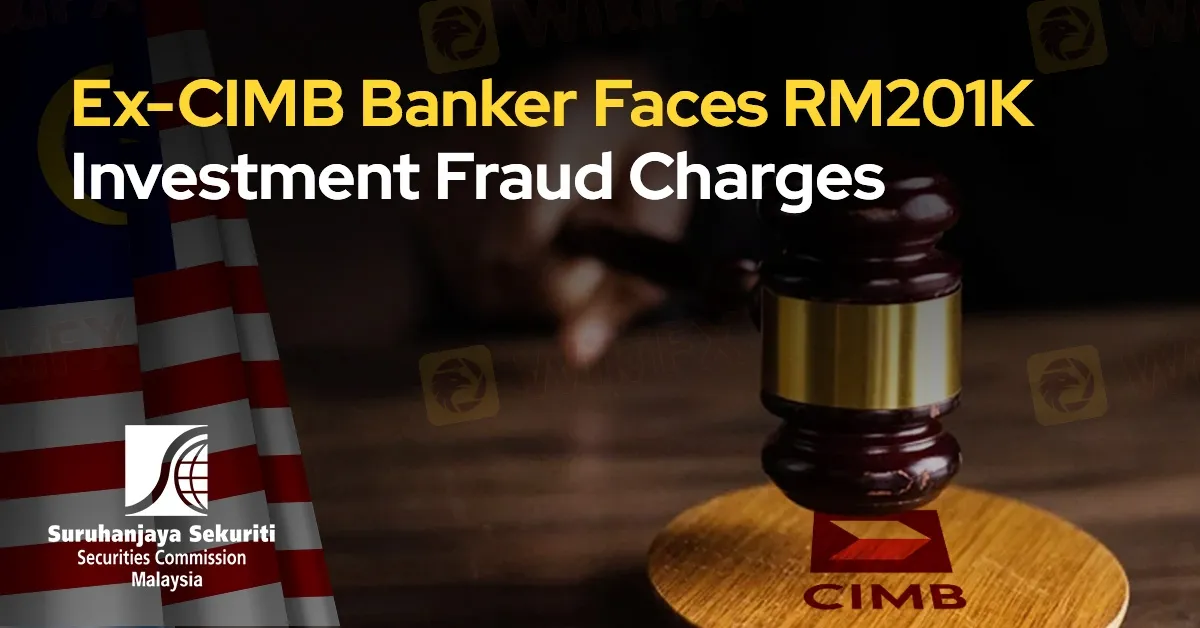简体中文
繁體中文
English
Pусский
日本語
ภาษาไทย
Tiếng Việt
Bahasa Indonesia
Español
हिन्दी
Filippiiniläinen
Français
Deutsch
Português
Türkçe
한국어
العربية
Ex-CIMB Banker Faces RM201K Investment Fraud Charges
Abstract:A former CIMB investment banker, Ruwan Amaresh Shaun Ponniah, has been formally charged by the Securities Commission (SC) in Kuala Lumpur for defrauding investors of RM201,000.

A former CIMB investment banker, Ruwan Amaresh Shaun Ponniah, has been formally charged by the Securities Commission (SC) in Kuala Lumpur for defrauding investors of RM201,000. The charges, presented across three different sessions courts, include a series of allegations related to investment fraud and unauthorized fund management activities.
According to the Securities Commission, Ponniah faces ten charges under Section 179(b) of the Capital Markets and Services Act 2007 (CMSA). These charges relate to fraudulent activities involving seven investors, whom he misled by promising to invest their funds in shares listed on both Malaysian and international stock exchanges. Ponniah allegedly used his position to deceive these individuals into believing they were making legitimate investments.
In addition to the fraud charges, Ponniah is also facing an eleventh charge under Section 58(1) of the CMSA. This charge accuses him of conducting fund management activities without the necessary license, further compounding his legal troubles. The Securities Commission's statement highlights that these offences occurred between October 2018 and June 2020.

During the court proceedings, Ponniah entered a plea of not guilty to all eleven charges. The court has granted him bail set at RM210,000, allowing him to remain free while awaiting further legal proceedings.
This case underscores the critical importance of regulatory oversight in the financial sector and serves as a cautionary tale for investors. It illustrates the potential risks associated with fraudulent investment schemes and the consequences of engaging in unlicensed fund management activities. The Securities Commission continues to emphasize the need for vigilance and due diligence in financial dealings to protect investors from similar fraudulent schemes.
As the legal process unfolds, the case of Ruwan Amaresh Shaun Ponniah will likely be closely monitored by both the financial community and the public, highlighting the ongoing efforts to maintain integrity and transparency within the investment industry.

Disclaimer:
The views in this article only represent the author's personal views, and do not constitute investment advice on this platform. This platform does not guarantee the accuracy, completeness and timeliness of the information in the article, and will not be liable for any loss caused by the use of or reliance on the information in the article.
Read more

The Hidden Checklist: Five Unconventional Steps to Vet Your Broker
Forex broker scams continue to evolve, employing new tactics to appear credible and mislead unsuspecting traders. Identifying these fraudulent schemes requires vigilance and strategies beyond the usual advice. Here are five effective methods to help traders assess the legitimacy of a forex broker and avoid potential pitfalls.

Doo Financial Obtains Licenses in BVI and Cayman Islands
Doo Financial, a subsidiary of Singapore-based Doo Group, has expanded its regulatory footprint by securing new offshore licenses from the British Virgin Islands Financial Services Commission (BVI FSC) and the Cayman Islands Monetary Authority (CIMA).

CFI’s New Initiative Aims to Promote Transparency in Trading
A new programme has been launched by CFI to address the growing need for transparency and awareness in online trading. Named “Trading Transparency+: Empowering Awareness and Clarity in Trading,” the initiative seeks to combat misinformation and equip individuals with resources to evaluate whether trading aligns with their financial goals and circumstances.

Malaysian-Thai Fraud Syndicate Dismantled, Millions in Losses Reported
The Royal Malaysia Police (PDRM) has received 26 reports concerning the Nicshare and CommonApps investment schemes, both linked to a major fraudulent syndicate led by a Malaysian citizen. The syndicate’s activities came to light following the arrest of its leader by Thai authorities on 16 December.
WikiFX Broker
Latest News
ASIC Sues Binance Australia Derivatives for Misclassifying Retail Clients
WikiFX Review: Is FxPro Reliable?
Malaysian-Thai Fraud Syndicate Dismantled, Millions in Losses Reported
Trading frauds topped the list of scams in India- Report Reveals
YAMARKETS' Jingle Bells Christmas Offer!
AIMS Broker Review
The Hidden Checklist: Five Unconventional Steps to Vet Your Broker
WikiFX Review: Something You Need to Know About Markets4you
Revolut Leads UK Neobanks in the Digital Banking Revolution
Fusion Markets: Safe Choice or Scam to Avoid?
Currency Calculator


